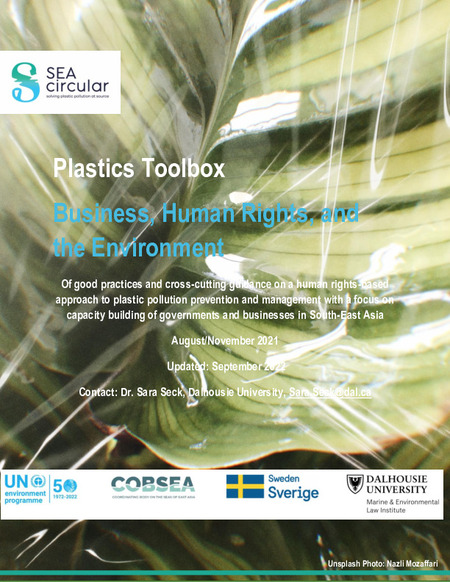Plastics Toolbox of Good Practices and Cross-cutting Guidance on a Human Rights-based Approach to Plastic Pollution Prevention and Management with a Focus on Capacity Building of Governments and Businesses in South-East Asia: Business, Human Rights, and the Environment
| dc.contributor | Asia & Pacific Office | en_US |
| dc.contributor.author | Dalhousie University | en_US |
| dc.contributor.other | en_US | |
| dc.contributor.other | en_US | |
| dc.coverage.spatial | Asia and the Pacific | en_US |
| dc.date.accessioned | 2023-02-16T08:21:44Z | |
| dc.date.available | 2023-02-16T08:21:44Z | |
| dc.date.issued | 2022-09 | |
| dc.identifier.uri | https://wedocs.unep.org/20.500.11822/41849 | |
| dc.description | Plastic pollution contributes to violations of many internationally recognized human rights including the rights to life, the highest attainable standard of health, a healthy environment, housing, water and sanitation, and adequate food. While the plastics crisis is a global issue, its impacts are disproportionately felt by certain populations, groups and ecosystems. This toolbox explores resources which integrate (or give context to) an environmental human rights-based approach to the problem of plastic pollution prevention and management. It compiles existing resources, guidance, tools, and trainings related to human rights and the environment with a focus on plastic pollution for the purpose of awareness and capacity building training of government and business duty bearers in the East Asian Seas region. | en_US |
| dc.format | en_US | |
| dc.language | English | en_US |
| dc.relation.ispartof | SEA Circular | en_US |
| dc.rights | Public | en_US |
| dc.subject | plastic waste | en_US |
| dc.subject | pollution control | en_US |
| dc.subject | pollution reduction | en_US |
| dc.subject | human rights | en_US |
| dc.subject | East Asia | en_US |
| dc.subject | environmental awareness | en_US |
| dc.subject | capacity building | en_US |
| dc.title | Plastics Toolbox of Good Practices and Cross-cutting Guidance on a Human Rights-based Approach to Plastic Pollution Prevention and Management with a Focus on Capacity Building of Governments and Businesses in South-East Asia: Business, Human Rights, and the Environment | en_US |
| wd.identifier.sdg | SDG 3 - Good Health and Well-Being | en_US |
| wd.identifier.sdg | SDG 10 - Reduced Inequalities | en_US |


